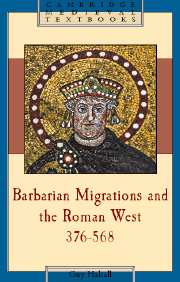Book contents
- Frontmatter
- Contents
- List of maps and figure
- Acknowledgements
- A note on spellings
- Part I Romans and barbarians in the imperial world
- 1 How the west was lost and where it got us
- 2 Defining identities
- 3 The late Roman Empire in the west
- 4 Society beyond the frontier
- 5 Romans and barbarians before 376
- Part II A world renegotiated: Western Europe, 376–550
- Part III Romans and barbarians in a post-imperial world
- Appendix: Gildas' narrative and the identity of the ‘proud tyrant’
- Bibliography
- Index
- Key to map 3 on page 75
- Cambridge Medieval Textbooks
2 - Defining identities
Published online by Cambridge University Press: 05 June 2012
- Frontmatter
- Contents
- List of maps and figure
- Acknowledgements
- A note on spellings
- Part I Romans and barbarians in the imperial world
- 1 How the west was lost and where it got us
- 2 Defining identities
- 3 The late Roman Empire in the west
- 4 Society beyond the frontier
- 5 Romans and barbarians before 376
- Part II A world renegotiated: Western Europe, 376–550
- Part III Romans and barbarians in a post-imperial world
- Appendix: Gildas' narrative and the identity of the ‘proud tyrant’
- Bibliography
- Index
- Key to map 3 on page 75
- Cambridge Medieval Textbooks
Summary
ETHNICITY
There is no room here for an extended discussion of the complex historiography of ethnicity. A brief, simplified outline must suffice, followed by my own understanding of ethnicity. The roots of the word lie in the Greek ethnos (pl. ethne) or people. Thus ethnicity should simply mean membership of a people. However that only relocates the problem of definition: what is a people? In the nineteenth century a people was held to be commensurate with the nation and thence with the state, and to be physically, morally and psychologically distinct. The biological, or more usually pseudo-biological, idea of race was confused with the sociological concept of ethnicity.
Such views of ethnicity are called ‘primordialist’. Even as students of the subject moved towards the idea that ethnicity was culturally rather than biologically defined, the notion persisted that it was a given, something you were born with. In the second quarter of the twentieth century the appalling uses to which these ideas could be put became all too clear. However, equally dreadful applications of notions of race and national characteristics had occurred much earlier in the processes of European colonisation. The horrific activities of Leopold II (1865–1909) of Belgium's ‘force publique’ in his private state of the Congo represent an extreme example. It is salutary to ponder the fact that only the use of racist concepts to justify genocide within Europe forced their reconsideration.
- Type
- Chapter
- Information
- Barbarian Migrations and the Roman West, 376–568 , pp. 35 - 62Publisher: Cambridge University PressPrint publication year: 2007



